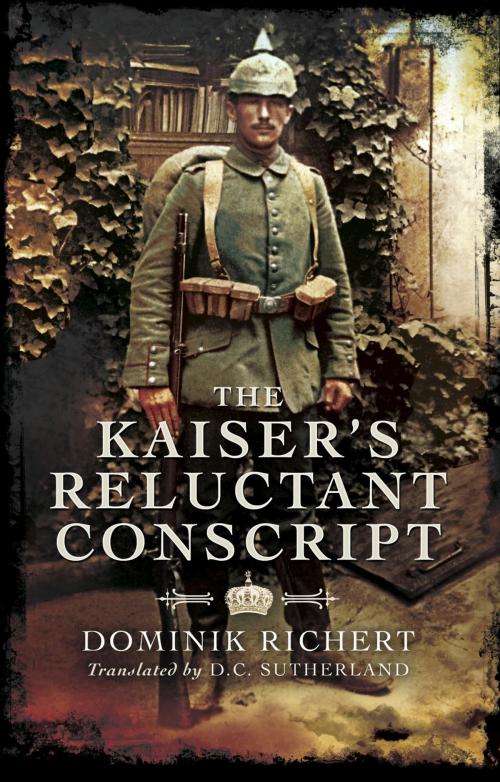| Author: | Dominik Richert, D C Sutherland | ISBN: | 9781783469871 |
| Publisher: | Pen and Sword | Publication: | January 19, 2013 |
| Imprint: | Pen and Sword | Language: | English |
| Author: | Dominik Richert, D C Sutherland |
| ISBN: | 9781783469871 |
| Publisher: | Pen and Sword |
| Publication: | January 19, 2013 |
| Imprint: | Pen and Sword |
| Language: | English |
As a conscript from Alsace, Dominik Richert realized from the outset of the First World War that his family was likely to be at or near the front line. He was a reluctant soldier who was willing to stand up to authority – and to avoid risks – in order to survive. His honest account of his part in the conflict, which saw him serving on both the Western and Eastern Front over the duration of the War, gives a lively picture of major events. He took part in fighting French and Indian troops in 1914, in the battle on Mount Zwinin in the Carpartians in 1915 and in the subsequent invasion of the western parts of the Ukraine and Poland. Later he was involved in the capture of Riga in 1917, before returning to the Western Front in 1918, where he witnessed German tanks in action at the Battle of Villers-Brettoneux.
As he could see no point in the war, he subsequently crossed no-man’s-land and surrendered to the French, becoming a ‘deserteur Alsacienne’. The book ends with Richert’s return home early in 1919.
A fascinating aspect of the book is the character author himself. He is increasingly willing to act independently as the narrative progresses, and he refuses to accept the propaganda that he encounters. He fights to survive, but feels little respect for his own army or the society that sent him to war.
As a conscript from Alsace, Dominik Richert realized from the outset of the First World War that his family was likely to be at or near the front line. He was a reluctant soldier who was willing to stand up to authority – and to avoid risks – in order to survive. His honest account of his part in the conflict, which saw him serving on both the Western and Eastern Front over the duration of the War, gives a lively picture of major events. He took part in fighting French and Indian troops in 1914, in the battle on Mount Zwinin in the Carpartians in 1915 and in the subsequent invasion of the western parts of the Ukraine and Poland. Later he was involved in the capture of Riga in 1917, before returning to the Western Front in 1918, where he witnessed German tanks in action at the Battle of Villers-Brettoneux.
As he could see no point in the war, he subsequently crossed no-man’s-land and surrendered to the French, becoming a ‘deserteur Alsacienne’. The book ends with Richert’s return home early in 1919.
A fascinating aspect of the book is the character author himself. He is increasingly willing to act independently as the narrative progresses, and he refuses to accept the propaganda that he encounters. He fights to survive, but feels little respect for his own army or the society that sent him to war.















